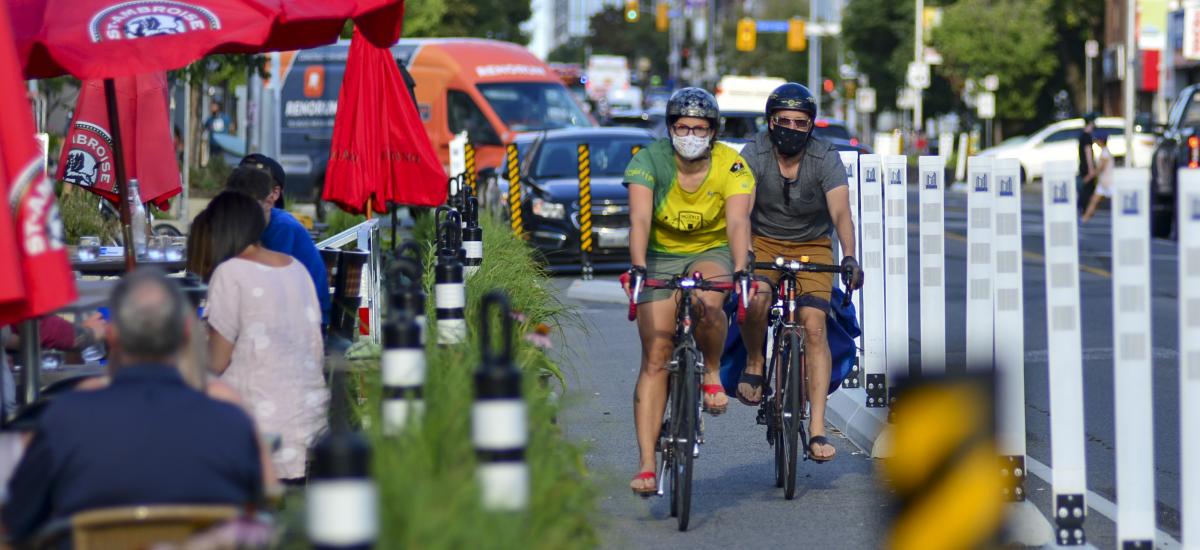Cycling Recommended for Recovery and Rebuild from Pandemic

The Toronto Office of Recovery and Rebuild’s (TORR) report on the impacts and opportunities of COVID-19 was recently completed and discussed at City Council this week. The report was approved by Council as a guiding document for the future of Toronto. Among the many fantastic recommendations and findings, there is a key emphasis on the importance of cycling and public transit in pandemic recovery and the report focuses on how to set up the city to achieve a sustainable future. It recommends expanding cycling infrastructure, ActiveTO, and investments in the Toronto Transit Commission (TTC) to make sure that residents can get around the city in a way that is safe and healthy.
Since the foundation of TORR, Cycle Toronto has been actively engaging with the Office, penning an open letter, taking many meetings, and deputing on behalf of their recommendations. Our vision for how active transportation could aid in a social and economic recovery for the city has been:
- Support essential workers and trips to essential businesses
- Enable sufficient access to outdoor space for mental and physical health
- Accelerate economic recovery and connect communities
Our guiding vision has been that ActiveTO would be rolled out quickly, expanded rapidly, and made permanent.
Thanks in part to our advocacy, the final TORR report included three recommendations related to cycling, summarized below:
Recommendation #59: Accelerate or make permanent crisis response and restart initiatives such as improved cycling infrastructure and weekend recreational street closures.
Recommendation #67: Develop a Winter City Plan to pursue winter solutions for ActiveTO to increase resilience on a year-round basis.
Recommendation #68: Build upon and accelerate a network of connected complete communities, including complete streets – for all uses, all ages, all abilities – as both a preventive health measure and to ensure equitable access, including building on and accelerating the additional cycling routes opened in the pandemic.
These recommendations are sensible and clear, and follow the first steps taken this summer to re-allocate road space for public health and economic benefits. The TORR report makes clear these measures cannot be a blip and will be essential both as we continue through the pandemic and try to build back better. It is time for Toronto to learn from past challenges and a summer with some success to position itself for a speedy recovery and a prosperous future across the city.
We urge the City of Toronto to prioritize, as part of the 2021 budget process, allocating resources and building capacity to plan, implement, expand, and make permanent the CafeTO, RapidTO, and ActiveTO programs.
Sign the petition to keep ActiveTO
We understand that Council will face a challenging budget process ahead. Ensuring that there is budget funding, staff capacity, and a clear runway so that departments can continue to carry out their mandate as outlined in the report will be crucial. Supporting vibrant outdoor cafes for restaurants, creating dedicated bus lanes with rapid service, and building 40+ km of new bike lanes a year across the city, including areas outside the downtown core, must become our new normal. In the year that saw our biggest expansion of new bike lanes, support for active transportation has grown with nearly 85% of Torontonians wanting more protected bike lanes. For the first time, we have political support to not only build high quality bike lanes, but also to make cycling accessible to more residents.
As the pandemic has continued, many residents, businesses, and community organizers have been vocal about what matters to them; many continue to express concerns about the safety of crowded buses and fear that more people will turn to personal vehicles which increases road hazards and pollution.There are still many barriers to cycling: price and availability make it challenging for everyone, particularly low-income residents, to access and purchase a bicycle. Many residents face barriers, particularly racism, that prevent them from feeling safe in public space. Building a more equitable city means ensuring that residents can get around safely in whatever way they choose, which includes freedom from harassment, dangerous driving, or hazardous road conditions.
Every page of the report makes clear that Toronto cannot revert to the status quo when the pandemic is over. We must create an equitable economy that supports the health of our city and planet. Torontonians deserve a sustainable future that leaves no one behind. We are committed to working with our members, City Hall, TORR, and anyone that can play a role in ensuring the COVID-19 recovery includes a sufficiently ambitious active transportation plan for Toronto.
Let’s keep and expand ActiveTO in 2021
Many of Toronto’s new bike lanes are not permanent; they are a rapid, but temporary expansion of the cycling network plan as part of ActiveTO. If City Council does not hear support from constituents, ActiveTO lanes could be ripped out faster than they were installed. Sign the petition to keep ActiveTO bike lanes now.
Sign the petition to keep ActiveTO
Help us keep the momentum going
The pandemic has brought into focus the benefits cycling has for a healthy city. More and more people are cycling than ever, and we need to ensure that new riders are able to continue to do so, while we enable more people to join them. Even $5 a month helps us with our education, outreach, and advocacy work through the pandemic toward a safer, healthier, and more vibrant cycling city for all.
